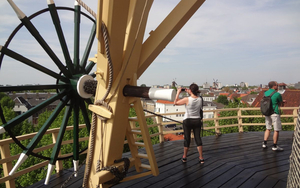*****
TONY Wilson is in hell. Guilty of the sin of pride, he is condemned to present Granada Reports programmes on the history of Manchester for all eternity. Microphone in hand, he delivers dull trivia and conducts brief, unedifying interviews with the shades of city notables, who give their name and a short summary of their civic contribution before dissolving into the mist. The Roman general Julius Agricola, the political philosopher Friedrich Engels and the scholar and occultist John Dee flash tantalisingly before him. But this isn’t Dante’s Inferno, and Wilson doesn’t have the time to question these intriguing figures at any length. The format simply won’t allow it.
Despite the performers’ best efforts, they come across like fragments from an acting workshop
This is not quite the premise of New Dawn Fades, but it’s pretty close. There’s an inevitability to this retelling of the Joy Division story that summons up images of lead-robed sinners shuffling around the eighth circle forever. The canonical scenes are all here: the inspirational Sex Pistols gig at the Free Trade Hall, the first TV appearance on So It Goes, impending fame – then medical crises, marital breakdown, depression, suicide. Stephen Morris smiling dopily; Peter Hook telling people to fuck off. Unfortunately, while individual sections work well enough, the overall effect is monotonous. In the manner of a TV news report we are repeatedly given a date and place followed by a two-minute reconstruction of the time Bernard Sumner met Howard Devoto or Ian Curtis called Tony Wilson a cunt. Wilson himself steps in and out of the action, peering over his glasses as he wryly comments on proceedings. But where the real man was equal parts charming and insufferable – a balance brilliantly captured by Steve Coogan in 24-Hour Party People – here he’s a little of the former and a great deal of the latter.
Act Two sees the play lurch awkwardly from trivia to tragedy as it focuses on Ian Curtis’s decline. All of a sudden we’re in John Osborne territory: shouting matches between husband and wife, the simmering resentment of the artist hemmed in by domesticity. But these scenes, which have a dramatic intensity that’s absent from the rest of the play, sit awkwardly in their isolation. Despite the performers’ best efforts, they come across like fragments from an acting workshop. Debbie Curtis – the only female character – has perhaps ten minutes of stage time in the first act, so when she complains that her husband has stopped talking to her you ask yourself when he ever talked to her before. The suicide itself is a nightmare flash in the dark, a genuinely unsettling piece of theatre that the play has done little to earn, and which it proceeds to squander with a perfunctory mea culpa from Wilson and a slide show of the departed.
The stories of Joy Division and Factory Records have been told before, most notably in the films 24-Hour Party People (2002) and Control (2007). A new telling needs its own angle. But rather than finding something original to say, New Dawn Fades merely combines the approaches of its predecessors, resulting in a kind of po-mo docudrama / kitchen-sink biopic that’s every bit as ungainly as it sounds. In the end its only claim to novelty is the historical dimension – the idea that it has something to say about the soul of Manchester itself. But it takes more than a few dates and cameos to tell the story of a city. In one scene near the end of the play, a hypnotised Curtis has a vision of himself as John Dee. The brooding young rock singer meets the pious old astrologer. Ironically, one of the only things they have in common is that neither of them are from Manchester. As Peter Hook might say, ‘What the fuck was all that about?’
Dancehouse Theatre, Thursday 14 April 2016.














